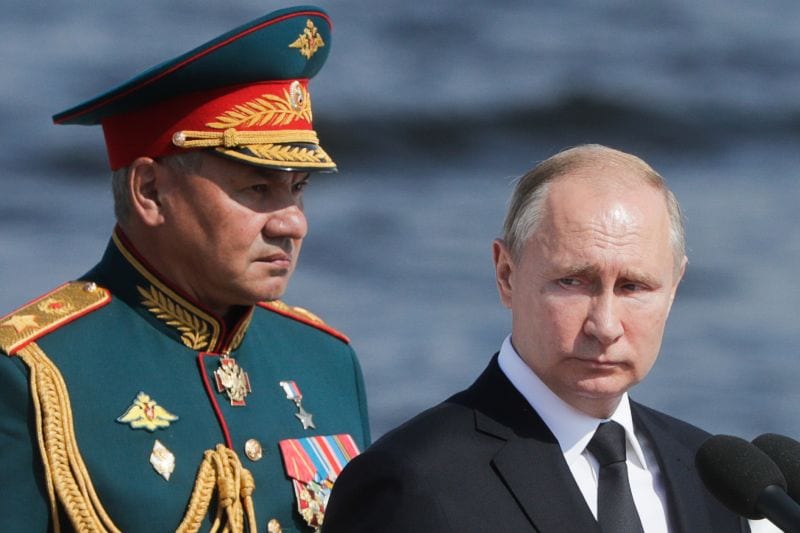We are already in the countdown to 2024, and one way or another, that date will be a watershed in Russian history.
During President Vladimir Putin’s recent vacation in the Altai Mountains with Defence Minister Sergey Shoygu, there was widespread speculation in certain quarters of the Russian media on questions of what might be implied about Shoygu’s influence on the president. Shoygu himself is Tuvan, the product of a marriage between a Tuvan Buddhist father and a Russian Orthodox mother, and identifies himself as an Orthodox Christian. However, you still hear Russians sometimes express reservations about Shoygu’s Tuvan-Mongolian roots, not least because he is arguably the second most popular political figure in the country after President Putin (#2 is either Lavrov or Shoygu).
These speculations tend to centre around beliefs in certain circles that Shoygu is spiritually more Buddhist than Christian, is familiar with shamanic and/or occult practices, may or may not be a re-incarnation of Genghis Khan, and seems to have an inexplicable charismatic influence on the president. Regarding the issue of Shoygu’s charisma, it certainly cannot be denied that he is a political survivor. He has held ministerial responsibility or the equivalent thereof since 1991, longer than any other political figure in Russia. In addition, there is the historical point that Tuva became a part of the Soviet Union only in 1944, having been an independent state (in name) during the interwar period, and having previously been occupied by China.
Another reason for concerns regarding Shoygu’s influence on President Putin is that, with Putin’s intended date of retirement not so very far away, it is widely believed that Shoygu’s popularity makes him one of the leading contenders to be Putin’s successor. This prospect poses a number of problems. Firstly, as Shoygu is only 3 years younger than Putin, there would be very little point in his becoming president in 2024 – it would hardly further the cause of continuity of leadership or political stability. The same point could be made in relation to Foreign Minister Lavrov or Sergey Ivanov, both very widely admired figures, but unfortunately the wrong age to succeed Putin.
Secondly, Shoygu enjoys the level of popularity which he does in spite of his track-record of vanity and political opportunism. Under his leadership, the Ministry for Emergency Situations was the only Russian government ministry which had its own department of journalists, employed full-time to guarantee that both the minister and his ministry always looked good. Many Russians ask, would a serious-minded man, a man who embodied real gravitas, really be so obsessed with his public image?
Regarding Shoygu’s personal religious coordinates, there is a lively debate. When he inspected the troops during the May 9th celebrations in 2014, he ostentatiously made the sign of the cross before doing so. This gesture evoked multiple interpretations:
- Some argued that Shoygu’s profession of Christianity is sincere.
- Others saw it as a patriotic gesture, as a sign that Shoygu understands and accepts the 500 year-old political contract between Russia’s minority non-Christian narody and its Orthodox Christian Leitkultur.
- Yet another interpretation was that Shoygu made this gesture because he believed it was important in a way which was specifically relevant to his role as Minister for Defence. The argument runs that the rank-and-file soldier must ultimately be prepared to lay down his life if necessary, and this preparedness can only be spiritually grounded. How can the commander-in-chief of the armed forces expect the ordinary soldier to be prepared to make the ultimate sacrifice if they do not share the same spiritual coordinates?
- Finally, there are those who interpreted Shoygu’s 2014 sign of the cross as a purely cynical, opportunistic gesture.
Take your pick.
As very many of these speculations have a spiritual or supernatural aspect, I tend to interpret them allegorically. Issues concerning Shoygu’s spiritual or religious coordinates, cultural identity and national loyalties encapsulate many aspects of a much broader question regarding how the basis of political loyalty to Russia can be articulated. We can say that, for Russian Orthodox Christians, the basis for political loyalty to the Russian state is not a contractual basis.
However, Russia is a traditional homeland for cultural groups which practice no fewer than 4 different world-religions, a historical inheritance which the state not only recognizes but also fosters. For Russian Buddhists, Russian Muslims and Russian Jews, the basis for political loyalty to the Russian state cannot be exactly the same as it is for Russian Orthodox Christians – in the case of Russia’s non-Christian minorities, the basis for political loyalty to the state must be contractual, and has been contractual ever since the time of Ivan the Terrible.
In grossly over-simplified form, the contract offered was security, plus the guarantee of cultural and religious freedom for the minority-narody in their traditional homelands, in exchange for tribute. As was also the case with the Achaemenid Empire, it wouldn’t be excessively cynical to say that the Emperor’s pluralistic religious policy was intimately connected to his taxation-policy. You pay the дань, in return for which we guarantee your cultural and religious rights at local level. That political contract has worked well for 500 years.
A number of years ago, Vladislav Surkov (himself also a plausible contender for the presidency in 2024) argued that, for approximately 400 years prior to the year 2014, Russia had geo-politically gravitated westward, but that 2014 was the point at which Russia had begun to re-orient itself eastward. Be that as it may, it seems that the country is not yet ready for a Tuvan Buddhist to become president.
Nor should the country be ready, necessarily.
For pragmatic reasons, for ideological glue, it will probably always be necessary for Russia’s political Leitkultur to be principally defined by Orthodox Christianity.
In any case, the Shoygu-debate is just one illustration of the many levels on which the country has a lot of soul-searching to do between now and 2024.
Padraig McGrath, political analyst

